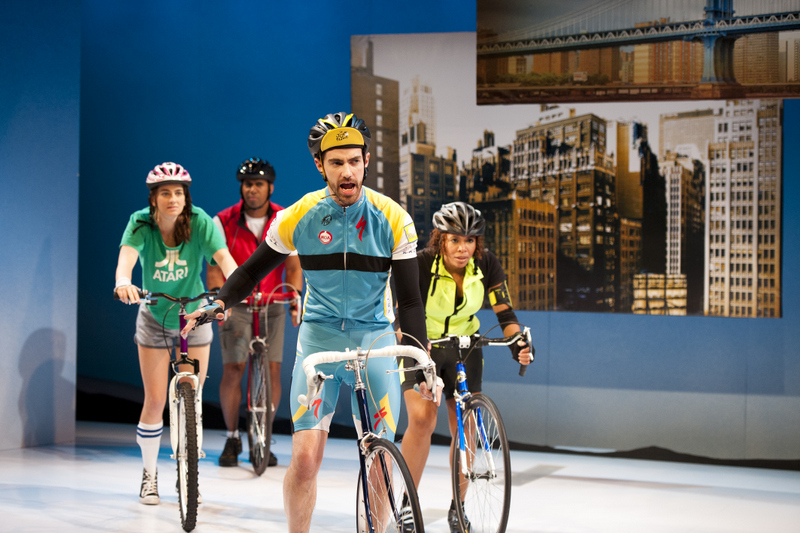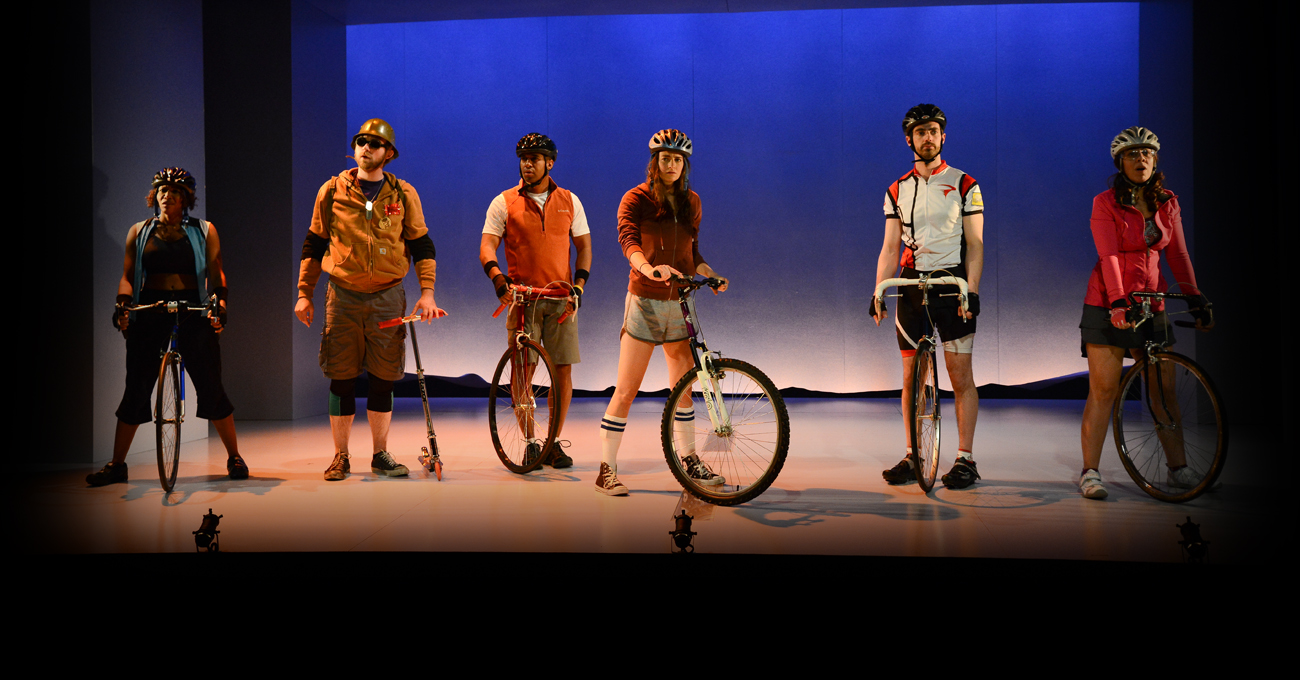Mike Lew’s Bike America directed by Moritz von Stuelpnagel and presented by the Ma-Yi Theater Company follows the vivid journey of a 27 year-old girl named Penny (Jessica Digiovanni) on a cross-country bike marathon across the United States.

Immediately at the beginning of the play the audience is immersed into this cross-country journey, opening with Penny on a bicycle. She shatters the third wall telling the audience quite frankly that she’s “a fuckhead”, setting the comedic tone for the rest of the performance. This play appears to be a light-hearted comedy at first with expletives seemingly used every three breaths, but as we travel along with Penny and her biker gang¬ we see insightful commentary about age, sexuality, gender, identity, and state culture in the United States.
Penny’s cross-country bike trip starts out with a group called “Bike America”– a cancer awareness bike gang. The group consists of a group leader and also Penny’s sex buddy, Ryan (Tom White), another romantic interest named Tim Billy (Landon G. Woodson), a vehemently lesbian couple, Rorie (Melanie Nicholl-King) and Annabel (Marilyn Torress), and finally the group’s physical and even mental support guy, simply known as the Man with the Van.
The group dynamics are an important part of this play, and in its essence the play is largely about people and relationships. It is established early on that Penny’s intention for the cross-country trip is not exactly for cancer-awareness but rather a personal escape from relationships and obligations at home and school. Undeniably one of the comic reliefs in the play (since it’s a comedy anyways) is Penny’s clingy not-boyfriend Todd (Vandit Bhatt). Although all signs point to Todd at some point being Penny’s boyfriend, Penny rejects that notion that a romantic relationship every existed between the two, instead claiming that it was just a casual relationship.

Although physically unfit to carry on the roughly 3,000 mile bike journey from Boston to California, Penny perseveres anyhow seeing the journey as an unshackling experience. She wants to start a new life in another city, and tries on each state as they move along, discovering in each that she doesn’t quite fit in. Ultimately the play is about self-discovery; all the elements combine in the play to contribute to this theme.
The play’s environment felt exclusive and almost secretive. Performed in the auditorium of a St. Clemente’s Episcopal Church in the middle of a wealthy neighborhood, it almost felt like my friend, Kevin and I didn’t belong. Most of the audience was dressed semi-formally, some even had journals and notepads, seemingly ready to write reviews in real-time. With little knowledge of what the play was going to be about, not having read any synopsis or description, I was surprised to discover how much I related to the play. Self-discovery is something that we all experience regardless of our wealth or social class, an idea that my assumptions prevented me from realizing.
Although one of the major themes was self-discovery, Lew’s intent wasn’t exactly clear. Some parts of the 90-minute play felt irrelevant or prolonged. Lew also sent confusing messages about other themes, most notably, same-sex marriage. In the play, the Lesbian couple, Rorie and Annabel, makes it a goal to get married in each state their bike route takes them through. If I recall the state correctly, when they get to Nevada the clerk rejects their application for marriage, citing that the application was incomplete because of the lack of a groom. They throw a fit despite the fact that the clerk claims he’s not a politician, simply a clerk working a minimum-wage job. In this scene, they bring a long a frustrated-at-life Penny to the clerk’s office to demonstrate what true love is (and by extension the importance of other people in your life). Unfortunately, I felt that the message didn’t get across. Penny doesn’t benefit from this scene, and I’m not too confident that the audience does either. Although I understood the sentiment, the couple’s protest was almost childish, rude, and unfounded. This scene in particular was prolonged more than it needed to be¬; although– I understood the idea of acceptance and being who and what you want to be that stemmed from it.
Scenes such as the ones cited above, made the play incoherent at times. But overall, Lew’s ideas were successfully conveyed through Penny’s and the biker gang’s journey. The play ends on a heart-rending note with Penny’s death (which is announced at the beginning of the play so I’m not ruining anything). She abandons the bike group growing frustrated at their convictions about family and relationships, getting run-over by a semi-truck. The special effects on this scene were actually spectacular. Continuing the audience interaction, the stage goes dark and floodlights shine bright on the audience while a loud semi-truck roars by.

Penny’s Gang
Penny’s ghost speaks to the audience about the other bikers while we watch an almost dream like vision of the bikers hitting the Pacific Coast– the end of their journey. This ending makes the development and impacts of Lew’s themes much more powerful. He reminds us that when we’re on our journey of self-discovery, we often neglect other people in our life, just like Penny did; we fail to realize that other people and our relationships contribute to our identity in ways we never imagined¬ until it’s too late.
Penny felt as though she needed to move to another state to live a meaningful life. In this pursuit she ran away from Todd and even from her new biker family, failing to see that it wasn’t the state that made the state, but rather the people. We discover that Penny was afraid and reluctant over scratching beyond the surface of her relationships. She didn’t see Todd has a boyfriend even though he did, and she didn’t see Ryan as anything more than a sex buddy. Ultimately, she discovers the importance of other people in the self-discovery process and living a meaningful only after it’s too late– once she’s dead.
Overall I enjoyed the performance. The play was hilarious. The constant use of vulgar, and the most creative vulgar filled lines I’ve ever heard made the audience and myself explode with thunderous laughter: “Peace out stinky bitches”, “You’re more self-absorbed than a Sham Wow” and “The Mississippi River’s my bitch!” among others. Sure, there was a flash of nudity for even more comedic purposes, but ultimately, the play was a commentary on some very comprehensive and thought-provoking themes.

